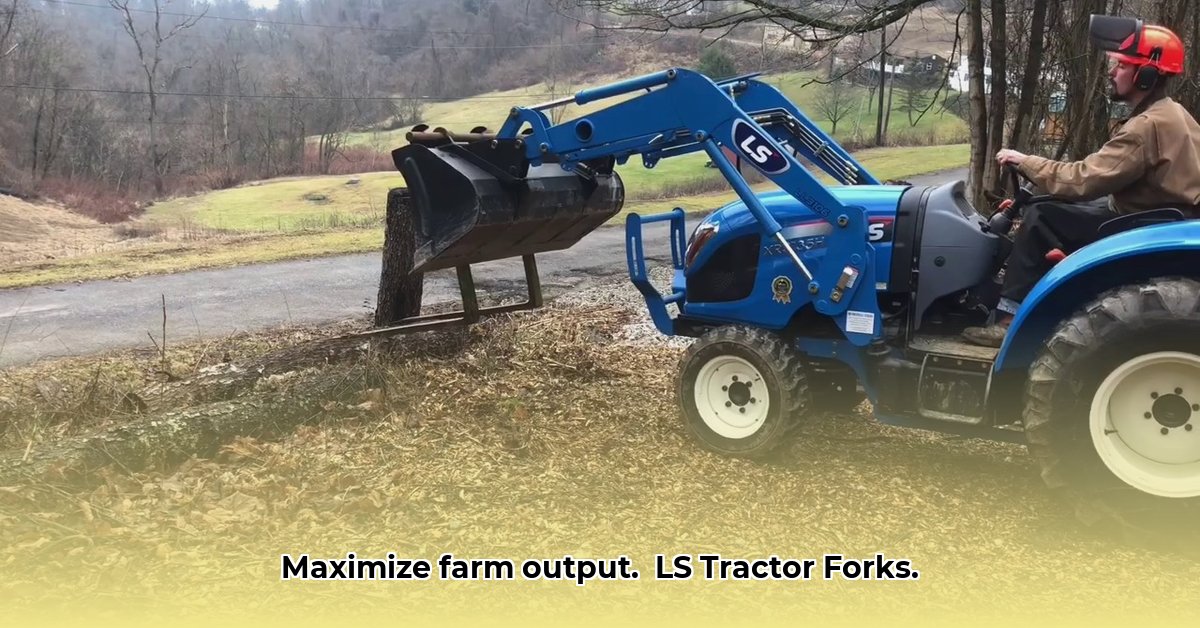
LS Tractor Forks: MT2 & MT2E Series – A Deep Dive into Farm Efficiency and Sustainability
Farming is evolving. The demand for efficient food production while preserving our planet necessitates innovative machinery. LS Tractor's MT2 and MT2E series forks represent a step towards this goal—tools designed to enhance farm operations while minimizing environmental impact. This article delves into the technical specifications, sustainability aspects, and actionable advice for stakeholders concerned with improving farm efficiency and promoting environmentally responsible agricultural practices. We'll examine how these forks contribute to sustainable agriculture, addressing both their potential benefits and limitations, based on currently available information. For more information on LS Tractor maintenance, check out this oil filter cross-reference.
Technical Specifications and Features: A Detailed Look
These forks are designed to lift and move heavy loads on the farm. They streamline tasks involving bales, pallets, and various materials, boosting efficiency. They're designed for compatibility with numerous LS tractor models. However, verifying compatibility with your specific tractor is crucial before purchase.
Unfortunately, comprehensive technical specifications, including exact lifting capacities, dimensions, and precise compatibility details, are currently unavailable from LS Tractor. This lack of publicly available data hinders a fully comprehensive assessment. We urge LS Tractor to improve data transparency. Contact your local LS Tractor dealer for model-specific specifications.
Here's a summary of the currently accessible information:
| Feature | MT2 | MT2E | Notes |
|---|---|---|---|
| Lifting Capacity | To be confirmed | To be confirmed | Requires disclosure from LS Tractor |
| Dimensions | To be confirmed | To be confirmed | Detailed measurements are currently unavailable |
| Tractor Compatibility | Varies, check manual | Varies, check manual | Always confirm compatibility with your tractor |
| Engine Type | N/A (fork attachment) | N/A (fork attachment) | The forks themselves do not have an engine |
Isn't it crucial to have detailed specifications for informed purchasing decisions? This lack of information from LS Tractor highlights a critical issue.
Sustainability on the Farm: A Holistic Perspective
Sustainable agriculture goes beyond fuel efficiency. It's about minimizing the environmental footprint while maintaining land health. How do the MT2 and MT2E forks contribute?
While efficient machinery can reduce fuel consumption and thus greenhouse gas emissions, we lack quantifiable data from LS Tractor to support this assertion for the MT2 and MT2E. Further, we need information on the manufacturing process: materials used, energy consumed, and end-of-life management strategies. This data is essential for a comprehensive sustainability assessment.
Moreover, increased mechanization presents a double-edged sword. While productivity increases, potential negative effects on soil health must be considered. Heavy machinery can compact soil, impacting water drainage, root growth, and plant health. Balancing efficiency with soil health requires careful consideration and responsible farming practices. Further research is vital to fully understand the long-term effects of these forks on soil health.
Actionable Advice for Key Stakeholders
Here’s how farmers, LS Tractor, and policymakers can promote sustainability:
For Farmers:
- Demand Transparency: Contact LS Tractor dealers to request comprehensive specifications and environmental impact data. This collective demand will encourage manufacturers to provide this information.
- Conduct Cost-Benefit Analysis: Analyze purchase price, maintenance, fuel usage, and productivity improvements to make informed decisions.
- Prioritize Regular Maintenance: Maintain your forks to maximize efficiency and extend their lifespan, reducing waste.
- Implement Integrated Practices: Combine fork use with soil-friendly farming methods to mitigate negative effects of mechanization.
For LS Tractor:
- Embrace Full Disclosure: Publicly release complete technical specifications. Conduct and publish a detailed Life Cycle Assessment (LCA) to transparently communicate the environmental impact of the forks.
- Invest in Research & Development: Support research into sustainable materials and designs for future iterations. Explore methods to minimize manufacturing energy consumption.
- Develop Recycling Programs: Implement effective recycling or repurposing programs for end-of-life forks.
For Policymakers:
- Provide Financial Incentives: Offer tax breaks or subsidies for farmers adopting sustainable agricultural machinery.
- Enforce Emission Standards: Implement stricter emission regulations for agricultural equipment, driving innovation in cleaner technologies.
- Fund Sustainability Research: Direct funding toward research investigating the environmental impact of agricultural machinery and sustainable solutions.
The Path Forward: Transparency and Collaborative Research
The lack of readily available data concerning the MT2 and MT2E significantly impedes informed decision-making regarding their sustainability. Comprehensive data from LS Tractor—including technical specifications and lifecycle environmental impact—is paramount. Further research is crucial to understand the long-term impact of mechanization on soil health. A collaborative effort among manufacturers, researchers, and policymakers is essential to bridge the gap between efficiency and sustainability in agriculture. Only through collective action can we achieve sustainable and efficient agricultural practices.